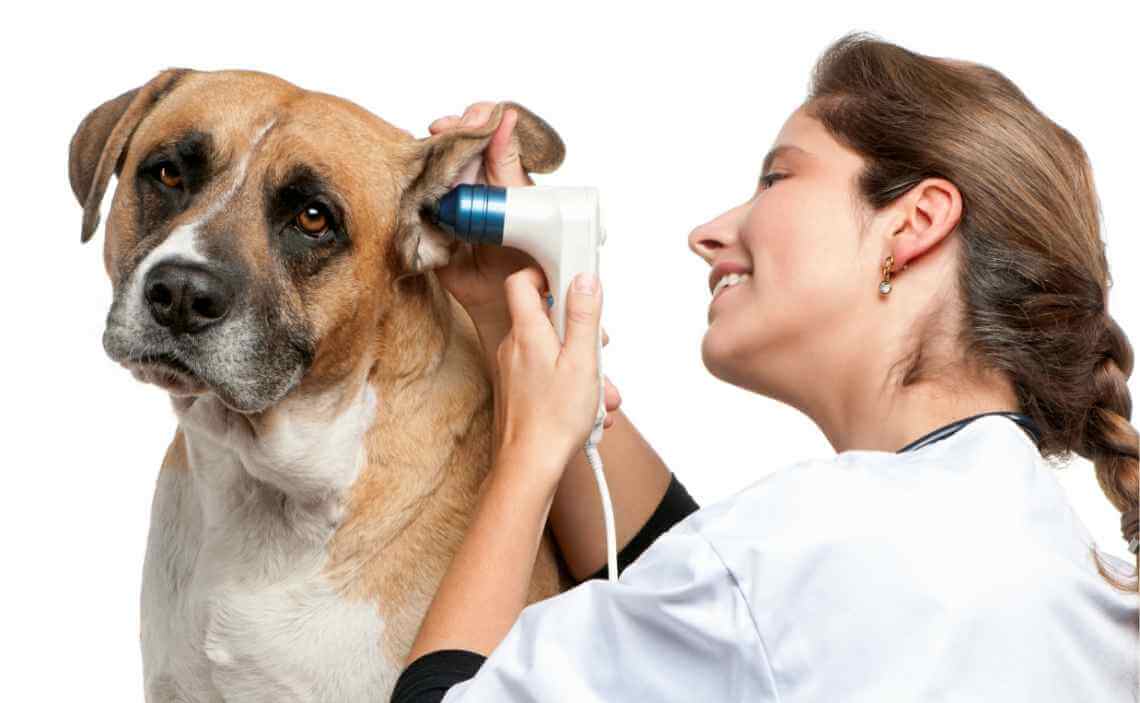 Ear infections are common in dogs. Certain breeds with floppy ears, such as Basset Hounds and Cocker Spaniels, have a higher risk for ear infections. An estimated 20 percent of dogs have some form of ear disease. Fortunately, there are steps you can take to reduce the length and severity of these episodes for your dog.
Ear infections are common in dogs. Certain breeds with floppy ears, such as Basset Hounds and Cocker Spaniels, have a higher risk for ear infections. An estimated 20 percent of dogs have some form of ear disease. Fortunately, there are steps you can take to reduce the length and severity of these episodes for your dog.
There are three types of ear infections. 1.) Otitis externa, which is an inflammation that affects the layer of cells lining the external portion of the ear canal. 2.) Otitis media and 3.) interna. Otitis media and interna refer to infections of the inner and middle ear canal. These infections often result from the spread of infection from the external ear. Otitis media and interna can be very serious and may result in deafness, facial paralysis and vestibular signs. For this reason, it is important to prevent infections and seek early treatment when problems arise.

Symptoms of Canine Ear Infections
Some dogs show no signs of ear infection except a buildup of wax and discharge in the ear canal. However, most dogs are uncomfortable and will show signs such as:
- Shaking their head
- Scratching at the affected ear
- Dark discharge
- Odor
- Redness and swelling of the ear canal
- Pain
- Itchiness
- Crusting or scabs in the ears

Causes of Canine Ear Infections
The canine ear canal is more vertical than the human ear canal. For this reason, dogs are more prone to ear infections. Ear infections are commonly caused by bacteria, yeast or both. In puppies, mites can also can be a source of infection.
Factors that may predispose your dog to ear infection include:
- Moisture, which creates a prime growing environment for bacteria and yeast
- Allergies
- Endocrine disorders, such as thyroid disease
- Autoimmune disorders
- Wax buildup
- Foreign bodies
- Injury to the ear canal
- Excessive cleaning

Veterinarian Diagnosis Needed for a Dog’s Ear Infections
If your dog is showing any signs of an ear infection, it’s best to get them in to see the vet right away. Expeditious treatment is needed because canine ear infections can be quite painful. The infection can quickly spread to the middle and inner ear. Your vet will ask you a series of questions related to your dog’s health and symptoms. Then, he or she will perform a physical examination.
In severe cases, your dog may need to be sedated to facilitate a deep inner ear exam. Do not try to treat ear infections at home because the symptoms could mimic a tumor, polyp or other serious condition. What appears to be an ear infection could also be an infestation of ear mites, tiny parasites that suck blood and fill the ear with waste matter that look like black coffee grounds. Your veterinarian will need to do a microscopic examination to diagnose.

Canine Ear Infection Treatment
The treatment of a normal ear infection is to thoroughly clean your dog’s ears using a medicated cleaner. Some vets prescribe a cleaner and a topical medication for home treatment. In severe cases, your vet may prescribe oral antibiotics and anti-inflammatory medications.
Once treated, most ear infections resolve within one to two weeks. But severe cases or those with an underlying condition may take months to resolve. Some dogs require surgery to remove the diseased tissue and prevent the recurrence of infection.

Prevention of Canine Ear Infections
Prevention is always best when it comes to canine ear infections. Here are three ways you can prevent them.
- Keep your dog’s ears dry to prevent moisture build up
- Identify and resolve any underlying issues such as allergies
- Clean your dog’s ears at home. Ask your vet to recommend the best ear cleaner for your dog’s breed, and don’t use paper towels or cotton to clean them out because they can leave fibers behind.

Canine ear infections are a common and recurring problem in many dogs. With your veterinarian’s help, you can keep your dog’s ears clean and comfortable. Remember, if your dog is showing any signs of an ear infection, seek treatment right away to ensure the problem does not become serious.
Has your dog had an ear infection? What treatment did your veterinarian prescribe? Please share with the rest of the Canine Campus dog lovers community in the comments below.


 5 Easy Steps to Brush Your Dog’s Teeth
5 Easy Steps to Brush Your Dog’s Teeth *Special Report*: Separating Fact and Fiction About the Surge in Canine Respiratory Illness
*Special Report*: Separating Fact and Fiction About the Surge in Canine Respiratory Illness Dog Itching Relief & Home Remedies for Skin Allergies
Dog Itching Relief & Home Remedies for Skin Allergies National Pet Poison Awareness Week – March 18 – 24, 2018
National Pet Poison Awareness Week – March 18 – 24, 2018






My chihuahua had ear infections in both ears. Poor Lil Man had to have a cortisone shot for inflammation ear drops and oral antibiotics. I’m just praying it resolved the problem.
I hope your fur baby feels better soon. Thanks for stopping by the Canine Campus blog!